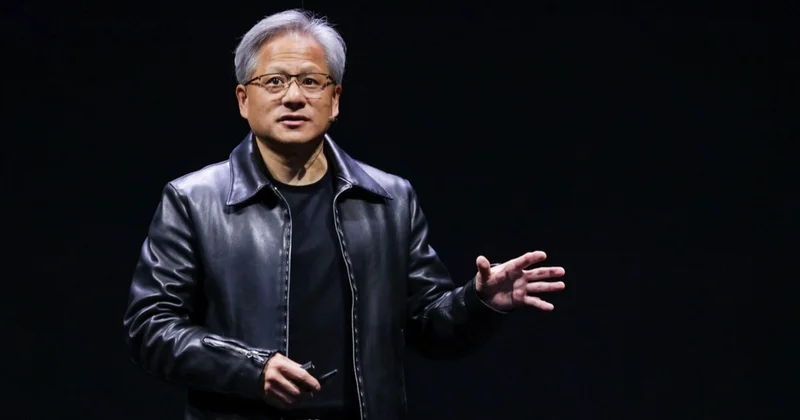XLM Insight | Stellar Lumens News, Price Trends & Guides
XLM Insight | Stellar Lumens News, Price Trends & Guides
You have to hand it to Jensen Huang. The man can sell a story. He stands on stage in that signature leather jacket, the high priest of the AI revolution, and tells us not to be afraid. He paints this gorgeous picture where AI isn't coming for your job, but instead will be your creative partner, unlocking new frontiers in robotics and biotech. It’s a beautiful sermon.
Too bad he can’t even get his own chips through customs.
While the CEO of Nvidia is out there selling us a techno-utopian dream, his multi-billion-dollar deal to sell advanced AI chips to the United Arab Emirates is collecting dust on some bureaucrat’s desk in Washington. He’s reportedly "frustrated." I bet he is. It must be infuriating when the messy, grubby reality of global politics crashes your perfectly optimized keynote presentation.
Let’s be real for a second. Every tech CEO has to deliver the "AI is good, actually" speech. It’s part of the playbook. He has to go on record with statements like, NVIDIA CEO: AI creates jobs, rather than replacing them. If he went on stage and said, "Yeah, our tech is probably going to vaporize half the white-collar jobs in the next decade, good luck," the Nvidia stock price would crater. So he sells the dream.
But the UAE deal? That’s the reality. It’s not a clean, inspiring story about human-AI collaboration. It's a grimy backroom brawl involving money, power, and paranoia.
The deal, announced back in May, was supposed to be a big win for the Trump administration—a show of force to counter China's own AI ambitions. The UAE promised to fund U.S. data centers and buy billions in Nvidia hardware. Everyone gets rich, America projects power, what's not to love?
Except, months later, the deal is completely stalled. U.S. Commerce Secretary Howard Lutnick is apparently holding the export licenses hostage. Why? Two reasons, according to the reports. First, he wants the UAE to make good on its promised U.S. investments before the chips get shipped. Second, and this is the big one, he’s worried about the UAE’s cozy relationship with China.
This is just a simple business transaction. No, "business transaction" doesn't cover it—this is a geopolitical chess move masquerading as a tech sale. It ain't about innovation; it's about leverage.

And what does Nvidia say officially? An Nvidia spokesperson gave the most predictable, soul-crushing PR statement imaginable, saying they "look forward to providing any assistance they need." Translation: "For God's sake, would you people in DC please sign the damn papers so we can book the revenue?" It's a masterclass in corporate speak, designed to say absolutely nothing while nodding deferentially to your government overlords.
Can you just picture the scene? Jensen Huang, a man who has built a company worth a staggering $4.59 trillion, having to sit there while some DC official slow-walks his grand plans. One senior Nvidia exec denied that the company is "alarmed," which is exactly what you say when you are, in fact, extremely alarmed.
The whole situation raises a thousand questions the official reports won't answer. What, specifically, are these "security concerns"? Is the White House genuinely afraid that the UAE will turn around and slip these top-tier chips to Beijing? Or is this just Lutnick flexing his muscles, using the China threat as a convenient excuse to squeeze Abu Dhabi for more investment? And what does "frustration" from the CEO of Nvidia actually look like? Does he throw things? Does he just stare silently into the middle distance? We'll never know.
They want us to believe this is all about high-minded national security strategy, but when you follow the money...
It's all become so exhausting. I remember when buying a graphics card was about playing Doom. Now, you can't ship a pallet of them without triggering a national security review and a diplomatic incident. Every piece of silicon is a pawn in the new Cold War. And while the U.S. government dithers, the UAE is already meeting with OpenAI’s Sam Altman and reportedly talking to TSMC about building a massive six-factory gigafab. The world, offcourse, doesn't wait for the Commerce Department to finish its paperwork.
The irony is just suffocating. Huang is selling a future powered by frictionless, intelligent machines, but his own company is being kneecapped by the most inefficient and irrational machine of all: human bureaucracy.
So, what's the real story here? It's that all the soaring rhetoric about AI creating a better tomorrow is just that—rhetoric. The future isn't being built in a clean room in Santa Clara. It's being held hostage in a conference room in Washington D.C.
Jensen Huang can be the most important CEO on the planet, but at the end of the day, he's still just another guy waiting for a permit. His algorithms can design drugs and create new worlds, but they can't approve an export license. For all the talk of a technological revolution, the world is still run by the same old forces: fear, greed, and political power. And no amount of processing power is going to change that.